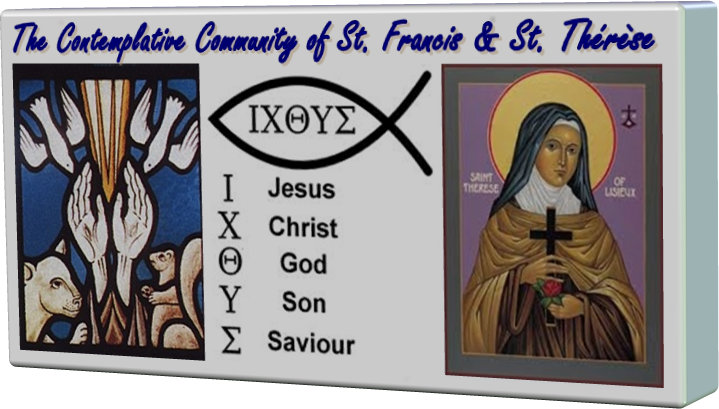

We are an Ecumenical Community of Contemporary Christians
Dedicated to a Life of Prayer
Made up of many denominations- We are Liberal & Conservative, Male & Female,
Ordained & Lay, Catholic & Protestant-Our Unity lies in our Devotion to God
Home
Main
Community
Prayer Life
Contact
Documents
Links
Facebook
Counseling
Home
Main
Community
Prayer Life
Contact
Documents
Links
Facebook
Counseling
Frequently Asked
Questions About The Divine Office Prayers
1) What is the purpose of these prayers?
Praying these prayers will benefit anyone in
building a more spiritual life. We encourage daily prayers of as many of the
prayers as will work within your schedule. This is how you join us: we have no
membership dues or joining process. If you pray with us, we consider you a part
of our brotherhood.
2) What is the significance of the 8 prayers?
We are a Dispersed Contemplative Community. We
have no particular location that we work from. I live in Wilmington, NC- that is
where my Community resides. If you live in Missouri or Texas or Pennsylvania-
that is where your Community resides. The daily prayers allows us to be on the
same page- going to God in the same way, reaching out to Him with Conviction and
Commitment as Brothers and Sisters in Christ. We are not separated by different
beliefs or different organizations- we are United by a mutual desire to serve
Christ in the Oneness of these daily prayers.
3) Do I have to say these prayers every day?
Although discipline and perseverance are
important in building a life of Devotion and Holiness- we believe that doing
things by rote is counter-productive. Pray as often as you can pray with
Conviction and Commitment. Always remember that it is better to pray a little
too often than a little too infrequently. You build discipline and closeness by
going to God in Praise. Try to pray Lauds, Vespers and Compline every day and
add other prayers when you feel especially motivated.
4) What if I can't do it that often either because of
lack of time or simply being too disorganized?
Nobody is keeping score. You get no
rewards or punishments from us for not praying often enough. However, there are
benefits from doing these prayers: it's like exercise for the soul! The more you
pray- the stronger your faith, the greater your increase in Hope and Charity.
5) What time should I pray?
There is no fixed schedule for these prayers.
Pray when the opportunity presents itself. Pray when you're in a quiet place.
The times listed below are merely suggestions.
Matins (6 a.m or first chance you have in the
morning)
Lauds or Dawn Prayer (after Matins if both prayers
are done or in place of Matins at 6 a.m.)
Prime or Early Morning Prayer (9 a.m.)
Terce or Mid-Morning Prayer (9 a.m.- can be done with
Prime)
Sext or Midday Prayer (12 p.m)
None or Mid-Afternoon Prayer (3 p.m)
Vespers or Evening Prayer (6 p.m.)
Compline or Night Prayer (before retiring, generally
at 9 p.m.)
6) Why are you using a different form than
the current Roman Catholic Liturgy of the Hours?
The prayers that we use are from the 1960 Office that was officially used by the Roman Catholic Church from 1960 to 1970.
I have a program that generates these daily prayers every day, that uses the
Douay-Rheims translation, which is in the public domain and I happen to love
this particular Divine Office. It is just a little shorter and simpler than the
previous versions and a little more detailed and inspiring than versions that
came after it. I have no permissions to use the current version but I would use
this version even if I did.
7) Are Roman Catholics able to use this version?
Yes. It has officially been approved for clerics
by Pope Benedict and since lay people are under no obligation to pray the
office, it doesn't particularly matter which one they use. We encourage Roman Catholics to pray these prayers with us
and to continue forward within their church without any change or compromise.
8) Aren't these prayers supposed to be prayed
in Latin only?
At the time these prayers were formulated, yes.
And by the practice of the Roman Catholic Church at the time, yes. However, as
the Presiding Bishop for the United Fellowship of Contemplative Christians and the
Director of the Contemplative Community of St. Francis and St. Therese- I am on
board with praying these prayers in the language that we speak and understand
best. In fact, we utilize Google Translate to publish a Spanish version of these
prayers daily, and for those who prefer the Latin, we publish the Latin version
of the prayers daily, as well.
